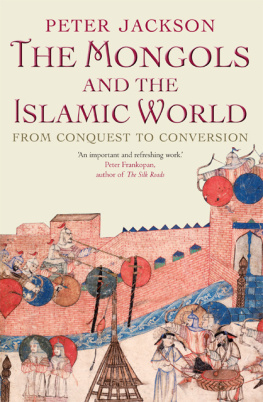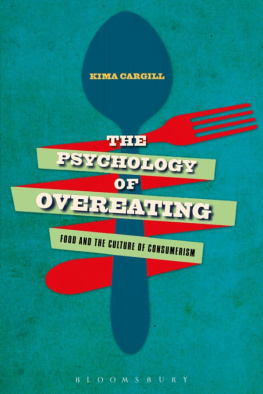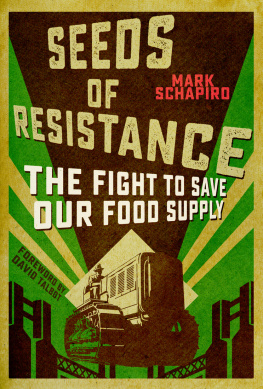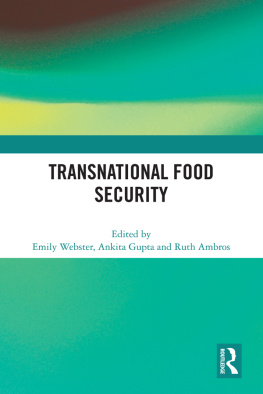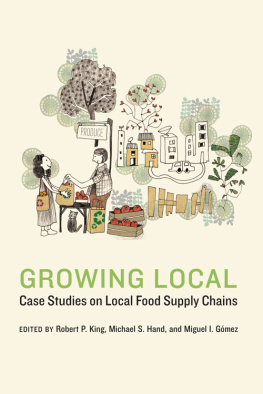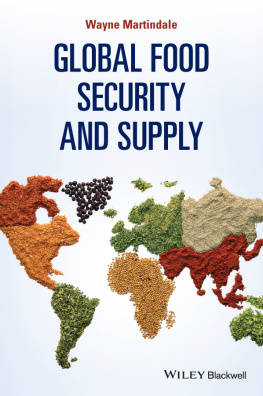Contemporary Food Studies: Economy, Culture and Politics
Series Editors: David Goodman and Michael K. Goodman
ISSN: 20581807
This interdisciplinary series represents a significant step towards unifying the study, teaching and research of food studies across the social sciences. The series features authoritative appraisals of core themes, debates and emerging research, written by leading scholars in the field. Each title offers a jargon-free introduction to upper-level undergraduate and postgraduate students in the social sciences and humanities.
Kate Cairns and Jose Johnston, Food and Femininity
Peter Jackson, Anxious Appetites: Food and Consumer Culture
Further titles forthcoming
Around 15 years ago, the Chronicle of Higher Education charted the emergence of food studies as an academic field, noting a recent publishing bonanza that had turned this formerly disdained field into what it called a hot commodity (Ruark 1999). While mostly celebratory in tone, the article worried about the populist tendencies within some areas of food studies that the author characterized as scholarship lite, undermining more serious attempts to gain food studies a legitimate place at the academic table. More recently, the New York Times ran a similar article (Spiegel 2012), reiterating the Chronicles anxiety about whether food is a worthy subject of academic study. Food studies is much less established as a distinctive research area in the UK (where I live and work) than in the United States, although one British author recently described it as a burgeoning field (Murcott 2013).
Having been trained in human geography and social anthropology, I was attracted by the wide horizons and inherent interdisciplinary of food studies. But I have also been repeatedly drawn back to the comparative perspective of my disciplinary training, feeling compelled to make the case that geography matters in terms of the contextual specificities of time and place, as well as being wedded to the relativizing impulses of social anthropology, with its characteristic suspicion of anything that is claimed to be absolute or universal. In what follows I attempt to show the value of this twin perspective, emphasizing the general and the specific, the disciplinary and the interdisciplinary. The book focuses on the pervasiveness of consumer anxieties about food in contemporary Western societies, tracing the rise and fall of specific food-related anxieties and seeking to understand their spatial and temporal variation. The distinctive insights of an ethnographic perspective are also brought to bear as a critique of over-hasty generalizations and, especially, the pervasive tendency to moralize food and eating.
The research project on which this book is based (the funding for which is acknowledged below) addressed the nature of consumer culture in an age of anxiety through an analysis of the moral and political economies of food. While many historical periods have been described as an age of anxiety, this book seeks to understand why we, in modern Western societies, are currently so anxious about food when governments and other official bodies assure us that it is safer than ever before. Charting the rise and fall of specific food anxieties and exploring their social geographies, the book seeks to understand our vexed relationship with food, exploring how food serves as a powerful lens on society, acknowledging its richly symbolic value while not losing sight of foods insistent and irreducible materiality.
As will become apparent, the books focus is on the social nature of contemporary food anxieties rather than on the way they are experienced psychologically by individual members of society. But it is often hard to separate the personal from the political or the local from the global, for food has a unique ability to bridge such conventional distinctions, transcending the psycho-social, the here-and-now and the there-and-then. As Warren Belasco asserts in Appetite for Change, Food is a strong edible dynamic, binding present and past, individual and society, private household and world economy, palate and power (2007: 5).
Before taking up my argument in more detail, I want to acknowledge some intellectual debts and offer some personal thanks. One of the great pleasures of academic life is the opportunity to work with other people who share your interests and enthusiasms but who are not afraid to offer challenge and critique. While this is, in one sense, a sole-authored book, it would not have been possible without the help and support of many friends and colleagues. First among these, I would like to acknowledge the team who worked alongside me on the CONANX project (Consumer culture in an age of anxiety). Helene Brembeck and Matt Watson were my co-investigators; Ben Coles, Maria Fuentes, Qian Gong, Richard Lee, Angela Meah, Richard Milne and Jakob Wenzer worked as research associates; Nick Piper was our PhD student and Daphne Lai provided administrative support. Qian and Angelas work features strongly in Chapters 6, 8 and 9 and Nicks research underpins the argument in ).
Second, I would like to acknowledge the generous funding of the CONANX project, provided via an Advanced Investigator Grant from the European Research Council (200912) and a subsequent Proof of Concept award (201314) to explore the potential practical application of this work. I have since embarked on an ERA-Net project (201417), focusing on food, convenience and sustainability and I would like to acknowledge my co-investigators on this new venture: .
Third, I would like to thank my colleagues in the Department of Geography at the University of Sheffield who have supported my work in many ways over the years and the wider cross-Faculty sustainable food group (SheFF), which has provided an invigorating interdisciplinary forum in which to develop my research. The Faculty of Social Sciences at Sheffield awarded me a Senior Research Fellowship in 201314, coinciding with a year-long study leave granted by my Department, which provided the opportunity to complete this book, together with continuing financial support for Angela Meah whose energy and enthusiasm, wit and wisdom, I have come to rely on. I am grateful to everyone at Sheffield, including both academic and professional services staff, for their collegiality and practical support. It is a great place to work. I would also like to pay tribute to an exceptional group of food-related PhD students including Lauren Blake, Jonas House, Ian Humphrey, Beth Kamunge, Anna Ludvigsen, Hannah Lambie-Mumford, Nick Piper, Ava Shackleford, Vincent Song, Roza Tchoukaleyksa, Bel Townsend and Sarah Wrathmell.
Colleagues in numerous other places have contributed to the thinking behind this project though they are not responsible for any of its shortfalls. Among them I would particularly like to acknowledge Anne Murcott with whom I have worked on several projects including the Changing Families, Changing Food programme for which she served as a critical friend (Jackson 2009). Anne was kind enough to read final drafts of two key chapters, offering sound advice and encouragement at a crucial time. I have also enjoyed working alongside Anne at the UK Food Standards Agency (FSA) where we both serve on their General Advisory Committee on Science. This also provides an opportunity to thank Sian Thomas and her colleagues at the FSA for supporting me in my role as chair of the Agencys Social Science Research Committee from which I have learned a great deal about current UK food policy (as reflected in ). I have also benefitted from the friendship and support of Richard Le Heron in the School of Environment at the University of Auckland, Harry West in the Food Studies Centre at SOAS, David Evans at the University of Manchester and Monica Truninger at the Institute of Social Sciences in Lisbon. Also deserving special mention is Polly Russell who has collaborated with me on numerous projects, providing valuable insights into the commercial world of food as well as helping me to communicate my research to a wider public.


